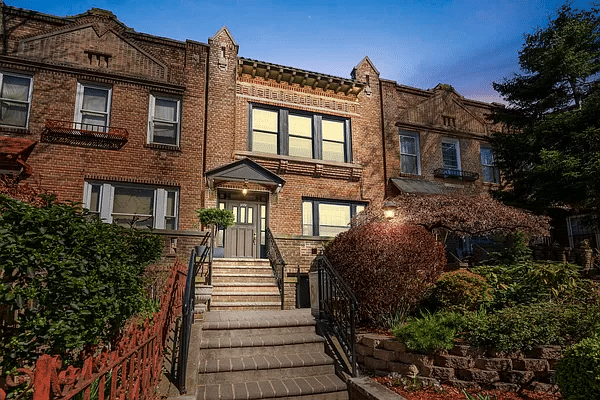Friday Links
Brooklyn Museum Fountain. Photo by Trevor Little Bubble Anxiety: Sell or Rent [Wall Street Journal] High Ri$e Continues on Homes [NY Post] Pro-Tenant Bill Passed by Council [NY Daily News] Manhattan Transfers [NY Observer] Mortgage Rates Fall on Investor’s Words [Bankrate] Williamsburg North [Curbed] Mugging on St. John’s Place [Daily Heights] New Grout Takes the…

Brooklyn Museum Fountain. Photo by Trevor Little
Bubble Anxiety: Sell or Rent [Wall Street Journal]
High Ri$e Continues on Homes [NY Post]
Pro-Tenant Bill Passed by Council [NY Daily News]
Manhattan Transfers [NY Observer]
Mortgage Rates Fall on Investor’s Words [Bankrate]
Williamsburg North [Curbed]
Mugging on St. John’s Place [Daily Heights]
New Grout Takes the Grunge Out [HGTV]









WSJ Article in full — Its lengthy so I suggest copy and paste into word.
FISCALLY FIT
By TERRI CULLEN
Bubble Anxiety Has Homeowners
Debating: Time to Sell or to Rent?
June 23, 2005
Erin Beavers is worried about seller’s remorse.
The 34-year-old executive recruiter in Northbrook, Ill., is planning on moving from her three-bedroom home in the suburbs outside of Chicago to a new community. But with home prices appreciating rapidly in her area, Ms. Beavers worries she’ll miss out on even greater profits if she sells her home now.
The value of her home has appreciated by more than $100,000 in the three years she’s owned it, based on sales prices of comparable homes in her neighborhood, she says. Reluctant to sell what she feels has been a good investment, Ms. Beavers is toying with the idea of keeping her current home and renting it out.
“I’m a single person, and I have no idea how to be a landlord, yet it’s scary to think about selling the house and missing out on more profit,” she says.
More homeowners are looking at real estate for its investment potential, not merely as a place to live. Investment properties accounted for more than one-third of residential transactions in 2004, up 14% to a record 1.8 million sales, according to a survey by the National Association of Realtors.
Deciding whether to sell a home you no longer plan to live in, or hold on to it as an investment property, has become more of a conundrum in the last several years as homeowners have seen values soar. The average U.S. home price jumped 11% in 2004, according to the Office of Federal Housing Enterprise Oversight’s house-price index; compare that to returns of 9% for the S&P 500 and 7.7% for long-term bonds.
Access to loans that allow you to borrow up to 100% of the price of the home also have eliminated the need for homeowners to sell their old home to buy a new one. And continued low interest rates have resulted in lower monthly mortgage payments, which potentially makes renting a more profitable venture.
The situation often arises when homeowners are either relocating to work elsewhere or retiring and moving elsewhere. Whether it makes more sense to sell a home or turn it into an investment property depends on a number of factors, including the strength of your local rental market, the state of your finances and your willingness to shoulder the burdens that come with being a landlord. In this column, I’ll walk homeowners through the decision-making process.
Anxiety-Inducing Question No. 1:
Does renting out your home make economic sense?
If rents are high in your area — higher than your mortgage plus taxes and other home expenses — and you think the property will appreciate significantly, then holding and renting generally makes economic sense.
If the property is in an area that doesn’t command high rents, there’s a chance you will take an annual loss if the monthly rent payment doesn’t cover your mortgage and expenses. Last year, as home prices surged, rents increased by just 2.7% nationwide, according to the OFHEO.
But even if the rent/mortgage calculation seems unfavorable, renting out your home still could be a good idea. The question is whether your home will appreciate at such a rate that it makes it worthwhile to accept the loss.
A WORTHWHILE INVESTMENT?
Homeowners who purchased homes in hot markets in recent years may find it hard to charge enough in rent to cover the cost of their mortgages.
Home value $800,000
Outstanding mortgage 400,000
Monthly mortgage payment 3,050
Monthly rent received 2,500
Repairs/management fees on rental 375
Net loss per month 925
Net loss per year 11,100
Source: Brian Feikema, RE/MAX Choice
Brian Feikema, a financial planner and real-estate agent with RE/MAX Choice in Fairfax, Va., offers the example of a typical home in the metropolitan Washington, D.C., area valued at $800,000, which brings in an average monthly rent of $2,500. As the box to the left shows, with a monthly mortgage payment of $3,050 and an extra $375 in repairs and property-management fees, a homeowner could be in the hole for $11,100 a year.
This figure doesn’t take into account the potential investment gains that are given up by locking hundreds of thousands of dollars in equity in an investment home. Had the homeowner sold the home and invested the $400,000 profit in equity in a security yielding 5%, he’d reap $20,000 in annual income. So the actual total cost of renting out the home is $11,100 in out-of-pocket loss on the rental and the $20,000 in unrealized investment gains, for a total loss of $31,100 a year. (This doesn’t take into account capital-gains taxes, which kick in when you sell the investments.)
In this scenario, could a landlord come out ahead? Yes, if the home continues to significantly rise in value over the years, Mr. Feikema says. The housing market would have to appreciate 4% in the first year to theoretically break even on the money-losing rental ($800,000 x 0.04 = $32,000). If the home rises 10% in value in the first year you have a paper profit of $48,900 ($80,000 – $31,100). If the price jumps 15%, you’re $88,900 ahead.
“You really are betting on appreciation in order to make it work,” Mr. Feikema says.
To get some idea how this scenario might play out using your own home’s value and cost outlay, determine what your home is worth, how much you owe lenders, what you pay in property taxes and the going rents in your area. From these hard figures, you can add assumptions about future home-price appreciation (be conservative!) and cash outlays on expenses that can provide guidance on whether it makes more sense to rent than to sell. Check out this worksheet1 published in this month’s edition of the American Institute of Certified Public Accountants’ Journal of Accountancy to get started on the calculations.
Anxiety-Inducing Question No. 2:
Can you handle the tenant from hell?
Becoming a landlord can be time consuming and expensive, particularly if you own an older home that tends to require more than just routine maintenance. And problem tenants can take months to evict, depending on your local laws. (Before you rent your home, rent a copy of 1990 thriller “Pacific Heights,” which pits two novice landlords against a nightmare of a tenant.) Check your town’s laws regarding problem tenants and eviction, or contact an attorney who specializes in real-estate laws on the proper way to handle problem tenants.
You can outsource some of these problems by hiring a property manager. For a fee, typically 8% to 10% of the monthly rent payment, a property manager handles all aspects of letting your home, from marketing the property and doing credit and criminal background checks of prospective tenants, to collecting rent and making necessary repairs.
Hiring a property manager is most appropriate for landlords who live far from their rental properties, says Rose Thomas, incoming president of the National Association of Residential Property Managers in Austin, Texas. But homeowners who live nearby and feel comfortable handling most landlord duties could broker a deal with a property manager to handle just one or two services for a lower cost, she says. If you do decide to use a property manager, be sure to factor in the cost.
Anxiety-Inducing Question No. 3:
Which way do taxes cut in the decision to sell or let a home?
Unfortunately, it depends. When selling a primary residence in which homeowners have lived in for at least two of the last five years, a couple filing a joint tax return can exclude up to $500,000 of the profit from capital-gains taxes, or $250,000 for singles.
“Most people pay no tax on the sale of a primary residence, so you want to keep that advantage,” says Claudia Kelley, associate professor at the Walker College of Business at Appalachian State University in Boone, N.C.
The profits on the sale of a rental property — minus selling fees and all the costs you incurred in improvements over the years — are typically taxed at the current long-term capital gain rate of 15%, Ms Kelley says. That said, you could defer the tax bill if you sell the home and invest the proceeds in a similar investment property, known as a like-kind exchange under Sec. 1031 of the tax code. (To learn more about 1031 exchanges, click here2.)
If you’re not planning to sell, rentals have their own tax advantages. Homeowners of primary residences can deduct the cost of mortgage interest and points, plus real-estate taxes, but with rental properties they also are able to write off expenses for maintenance and property management, as well as annual depreciation — to calculate depreciation, divide the the fair market value of the home, excluding the land, by 27.5 years — against rental income.
And, if the market turns on you and you end up losing money should you eventually decide to sell, the rental reaps the bigger tax benefit. You may be able deduct the loss on a rental home on your federal income tax; homeowners of primary residences aren’t allowed to write off losses on the sale of homes.
Ideally, you should consult a certified public accountant who specializes in property rentals to discuss your potential tax liability when selling a rental property. For a primer on tax considerations when selling your home, click here3. You should also read IRS Publication 5274 (Residential Rental Property).
That grout . . . advertised as impervious to wine stains!
That’s MY bathtub!
[d’oh, I know they are talking kitchens…I just thought it was really FUNNY]
can’t get the wall street article, can anyone post it?